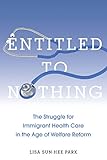Entitled to Nothing : The Struggle for Immigrant Health Care in the Age of Welfare Reform / Lisa Sun-Hee Park.
Material type: TextSeries: Nation of Nations ; 29Publisher: New York, NY : New York University Press, [2011]Copyright date: ©2011Description: 1 online resourceContent type:
TextSeries: Nation of Nations ; 29Publisher: New York, NY : New York University Press, [2011]Copyright date: ©2011Description: 1 online resourceContent type: - 9780814768013
- 9780814768334
- 362.1086912 23
- RA448.5.I44 P66 2016
- online - DeGruyter
| Item type | Current library | Call number | URL | Status | Notes | Barcode | |
|---|---|---|---|---|---|---|---|
 eBook
eBook
|
Biblioteca "Angelicum" Pont. Univ. S.Tommaso d'Aquino Nuvola online | online - DeGruyter (Browse shelf(Opens below)) | Online access | Not for loan (Accesso limitato) | Accesso per gli utenti autorizzati / Access for authorized users | (dgr)9780814768334 |
restricted access online access with authorization star
http://purl.org/coar/access_right/c_16ec
In Entitled to Nothing, Lisa Sun-Hee Park investigates how the politics of immigration, health care, and welfare are intertwined. Documenting the formal return of the immigrant as a "public charge," or a burden upon the State, the author shows how the concept has been revived as states adopt punitive policies targeting immigrants of color and require them to "pay back" benefits for which they are legally eligible during a time of intense debate regarding welfare reform. Park argues that the notions of "public charge" and "public burden" were reinvigorated in the 1990s to target immigrant women of reproductive age for deportation and as part of a larger project of "disciplining" immigrants. Drawing on nearly 200 interviews with immigrant organizations, government agencies and safety net providers, as well as careful tracking of policies and media coverage, Park provides vivid, first-person accounts of how struggles over the "public charge" doctrine unfolded on the ground, as well as its consequences for the immigrant community. Ultimately, she shows that the concept of "public charge" continues to lurk in the background, structuring our conception of who can legitimately access public programs and of the moral economy of work and citizenship in the U.S., and makes important policy suggestions for reforming our immigration system.
Mode of access: Internet via World Wide Web.
In English.
Description based on online resource; title from PDF title page (publisher's Web site, viewed 01. Nov 2023)


